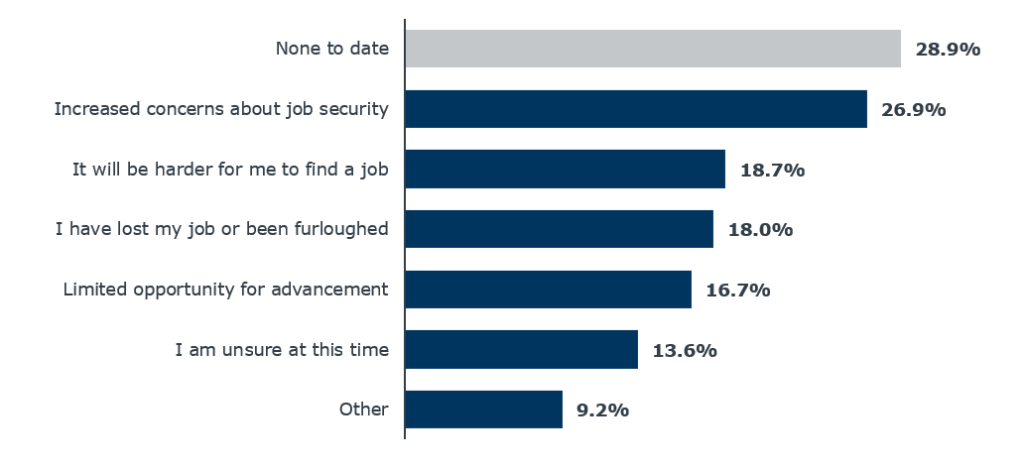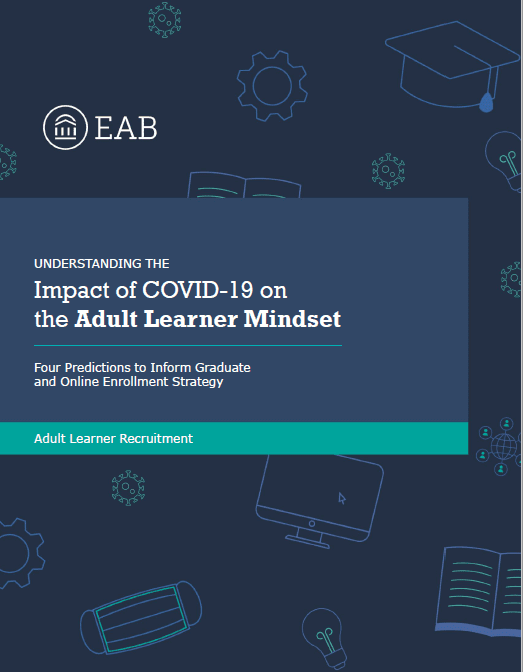Back in March, one in four enrollment leaders told us they weren’t sure whether they would hit their adult learner enrollment targets because of the emerging COVID-19 crisis. While a lot has changed since then, uncertainty about enrollment remains a consistent theme across our conversations with campus leaders.
To help our Adult Learner Recruitment partners better understand how to approach their graduate, online, and adult degree completion enrollment strategies in the midst of the pandemic, EAB went straight to the source: conducting a survey of 1000+ current and prospective adult learners. Here’s what those students told us about how the pandemic has impacted their plans so far—along with three key takeaways for your strategy.
EAB’s Adult Learner Recruitment division conducted two surveys of current and prospective adult learners in 2020 to learn about their enrollment motivations, preferences, and concerns:
- Our COVID-19 Adult Learner Pulse Survey investigated changes in prospects’ enrollment plans, employment and financial situations, and attitudes toward online learning during the coronavirus pandemic. The reported results include responses from 1,036 participants, which were collected in May 2020.
- Our Adult Learner Mindset Survey explored prospects’ motivations for pursuing education further, sources used to gather information about programs, key decision criteria, preferred communication channels, and perceptions of online learning. The reported results include responses from 1,077 participants, collected in winter 2020.
Our key findings
34.4%
Faced with economic and personal uncertainty, many adult learners’ plans are in flux
As of late May, 34.4% of prospective adult learners said that COVID-19 had changed their plans to pursue additional education. Adult learners’ enrollment decisions have always been intertwined with their personal and professional responsibilities. And with an event as transformational as the pandemic, it’s no surprise that such a large number of students are changing their plans.
Our survey indicated just how wide-reaching COVID 19’s economic impacts have been for prospective adult learners, with over 70% of participants reporting that the pandemic had negatively impacted their current or future employment outlook. The most frequently reported financial effects of COVID-19 were increased concerns about current job security or future job prospects. However, many participants had experienced more severe repercussions, with one in five participants reporting they had been fired or furloughed.
“What impact has the COVID-19 pandemic had on your current job and/or future employment prospects?”

Participants also told us about the many other ways their employment status or plans had been affected, including changes due to spouses’ employment and concerns about the safety of their job during the pandemic.
Adult learners describe wide-reaching and diverse effects on employment
Free responses on the impact of COVID-19
“My partner is unlikely to find a job in academia next year, so I need a better paying job”
“I quit [my] job due to lack of safety and protocol.”
“My hours were significantly reduced.”
Understanding the “hesitators” and the “accelerators”
While we found that a large number of prospective students said their enrollment plans had changed, we also saw that the same factors that motivated some to enroll actually caused others to defer.
Starting with the “hesitators,” many of these adult learners will choose to delay their plans because of more uncertain financial situations. Because of a job loss, furlough or pay cut, they’re now operating on a tighter budget and have decided that they can no longer invest in their education right now. In addition, we also heard from many students who hadn’t yet experienced a job loss or similar financial challenge, but who feared they might face one soon and were motivated to continue earning money right now, rather than returning to school.
And as we discussed in our report, in addition to financial concerns, doubts about the quality of remote and online instruction during the pandemic also came into play for prospects considering delaying their enrollment plans.
“Will I have enough money to attend school? Should I reconsider in order to pay for more important bills?… For those who can’t afford school, it becomes a want over a need. Education is important, but can I afford it?”
–Prospective adult learner
In contrast to the hesitators, we also expect to see a large swath of adult learners who will choose to expedite their plans to enroll. This group of “accelerators” will follow some of the countercyclical patterns that we’ve seen previously with graduate and adult learner enrollment during recessions.
Our research showed that, within this group, many prospects will be motivated to enroll sooner than they had previously because of new worries about job security or employment prospects. These students seek to gain new skills, make themselves more attractive to employers, and wait out a tough job market. And while many of these prospects will enroll in traditional degree programs, some will be more interested in non-degree credentials.
“I was not going to apply this soon, but it is better to start now because we don’t know what the job market will look like. It’s better to have more skills and degrees to increase [my] chances of getting a job.”
–Prospective adult learner
While we found that many adult learners’ plans will shift because of the pandemic, institutions can better position themselves during the crisis by keeping the following three takeaways in mind.
3 takeaways for enrollment leaders
1. Plan for increased volatility in your prospect pool
As long as the public health and economic situations continue to shift, enrollment leaders can expect to be managing a more turbulent prospect pool across the coming months. To engage prospects with relevant information and accurately gauge your recruitment performance, it will be more important than ever to understand and market to prospects based on intent throughout the student journey.
Recommendation: Discover prospect intent using tactics such as micro-surveys and admitted student surveys. stage. These tools can help your institution determine the appropriate audience, channel, messaging, and call to action for communications.
2. It’s more important than ever to show return on education
While conveying the value of your program is always key to recruiting adult learners, demonstrating return on education now can be a crucial tool in attracting students to your institution during this period of economic uncertainty.
Recommendation: In addition to providing data on program graduates’ career outcomes, consider showcasing your career support services as a way to illustrate the value your institution can offer for students seeking to upskill or change jobs.
3. Review your program portfolio
Changes in regional and national labor markets will likely continue to drive turbulence in your prospect pool. As they continue to shift, it will be essential to monitor and assess your program offerings to ensure they align with employer demand.
Recommendation: Periodically audit program portfolios to identify your vulnerabilities and reprioritize opportunities.
While the upcoming months will bring enrollment leaders into uncharted territory, these approaches can help your institution navigate the new normal—and ensure that students’ preferences and concerns continue to guide your strategy.
Insights From 1,000+ Adults Considering Completing Their Bachelor's
There are approximately 3.5 million adults who have completed some college and have a high potential in going back to earn their bachelor’s degree. Guests discuss findings from a survey of more than 1,000 of these potential “degree completers” and share how colleges can help these adults overcome their fears and return to higher education.
2 strategies to grow enrollments in your nursing programs (during and after COVID-19)
Learn why growing demand for nurses doesn’t always translate to growth in enrollments—and how you can recruit nurses despite these challenges.



